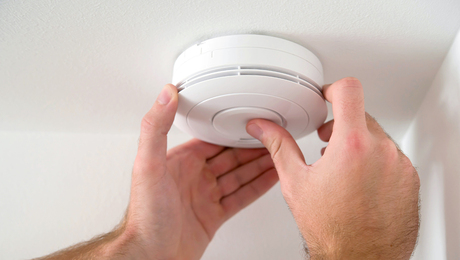Should I use 1/2 inch drywall or 5/8 inch drywall on a ceiling?
Discussion Forum
Discussion Forum
Up Next
Video Shorts
Featured Story

Learn the specific guidelines for location, spacing, and clearance for optimal safety.
Featured Video
Video: Build a Fireplace, Brick by BrickHighlights
"I have learned so much thanks to the searchable articles on the FHB website. I can confidently say that I expect to be a life-long subscriber." - M.K.

















Replies
1/2 inch is fine with 16" centers.
If 24, 5/8's would be a better choice. Never used ceiling board.
You can also get 1/2" type C (which stands for ceiling) if you buy it at a real building supply or a dW supply - not a big box. Type C is a little stronger then 1/2" regular.
1/2" is used by all te national builders on ceilings that are on 24" centers..
5/8 is stif and solid but heavy . 1/2 will work well over 16oc
5/8" drywall is also more
5/8" drywall is also more sound isolating
Isn't 5/8 DW a fire code requirement for basements or ceilings under living areas?
5/8" is best
5/8 on ceilings and it's best on walls also. You will get a smoother and more sound job using the thicker material. It will cost little more than 1/2" so there's no reason not to use it. A drywall lift will eliminate the weight issue.
The "little more expene" of
The "little more expene" of 5/8" board for all applications is a little missleading.
jamb extensions for windows and doors add up in a hurry when you add in labor cost. If you install 5/8" board on just the exterior wall and plan for it before you order windows and door you can save the labor cost with factory applied jamb extension. Interior wall still become a PITA though. Every interior door jamb will need a 1/4" jamb extension. that'll cost you way more in labor than the differance between 1/2" and 5/8" dw on interior partion walls.
Quality
It comes down to an issue of quality. If one wants a discernibly better job, then 5/8 will deliver that. Ordering the interior door jambs with the additional extension will not break anyone's bank. It's not a PITA at all. Unless one considers planning ahead difficult.
The extension jamb point is a good one. For his ceiling, not sure that it's relevant.
The reply was to his "5/8" on
The reply was to his "5/8" on ceiling and best on walls"
Commercial work used a lot of 5/8" f/c board on metal studs. Fire rated wall assemblies are the main reason for it. The door jambs and windows assemblies are also metal for the same reason. Door and window bucks are designed to accomodate the additional wall thickness for those applications.
I can't imagine what the upcharge would be for ordering all your doors and windows jambs a quarter inch larger than normal. or paying the trim guy to add 1/4" jamb extentions to every thing. Most would just trie to beat the snot out of the board around the rough opening and move on :)
You don't think a finish carpenter would be able to accomodate the 1/4" when applying trim molding?